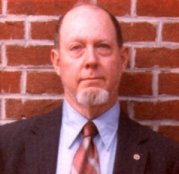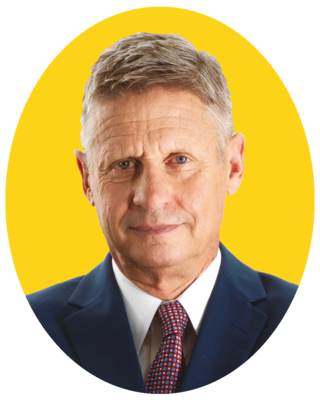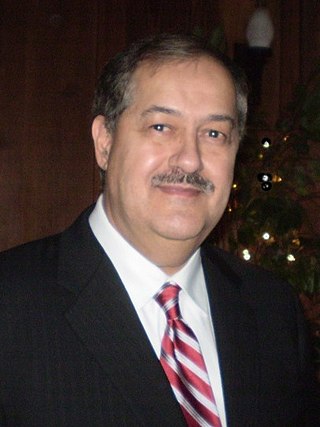The Libertarian National Convention is held every two years by the Libertarian Party to choose members of the Libertarian National Committee (LNC), and to conduct other party business. In presidential election years, the convention delegates enact a platform and nominate the Libertarian presidential and vice-presidential candidates who then face the nominees of other parties in the November general election.
The 2004 Libertarian National Convention was held from May 28 to May 31, 2004, at the Marriott Marquis Hotel in Atlanta, Georgia. The delegates at the convention, on behalf of the U.S. Libertarian Party, nominated Michael Badnarik for president and Richard Campagna for vice president in the 2004 presidential election. The convention was televised nationally on C-SPAN.

David Peter Bergland was an American politician who was the United States Libertarian Party's nominee for President of the United States in the 1984 presidential election, and also served twice as the chair of the Libertarian National Committee.
The Constitution Party National Convention is held by the United States Constitution Party every two to four years. As of April 2024, there have been nine.

The Libertarian Party of Oregon is a political party representing the national Libertarian Party in the U.S. state of Oregon. It is organized as a minor party for state election law, and recognized by the Oregon as a statewide nominating party.

The 2008 Libertarian National Convention was held from May 22 to May 26, 2008, at the Sheraton Hotel in Denver, Colorado. The delegates at the convention, on behalf of the U.S. Libertarian Party, nominated Bob Barr for president and Wayne Allyn Root for vice president in the 2008 presidential election. The convention was televised nationally on C-SPAN.
The Libertarian Party of the United States was formed in Colorado Springs in the home of Luke Zell by a group of individuals led by David Nolan on December 11, 1971, after several months of debate among members of the Committee to Form a Libertarian Party, founded July 17. The formation was prompted in part by price controls and the end of the Gold Standard implemented by President Richard Nixon. The Libertarian Party viewed the dominant Republican and Democratic parties as having diverged from what they viewed as the libertarian principles of the American Founding Fathers. This group included John Hospers, Edward Crane, Manuel Klausner, Murray Rothbard, Roy Childs, D. Frank Robinson, and Theodora (Tonie) Nathan.
The 2012 Libertarian National Convention, in which delegates of the Libertarian Party (LP) chose the party's nominees for president and vice president in the 2012 general election, was held May 2–6, 2012, in Las Vegas, Nevada, at the Red Rock Resort Spa and Casino. Former Governor of New Mexico Gary Johnson won the presidential nomination on the first ballot. Retired California state court judge Jim Gray won the vice presidential nomination, also on the first ballot. The convention also chose to replace most of the Libertarian National Committee party officers and members-at-large.

James Arthur Hedges was an American politician who served as the tax assessor for Thompson Township, Pennsylvania and as the Prohibition Party's 2016 presidential nominee. He was the only member of the Prohibition Party to be elected to public office in the 21st century, and the first since 1959.

The 2000 Libertarian National Convention was held in Anaheim, California, from June 30 to July 4, 2000. Harry Browne was again chosen as the party's presidential nominee, becoming the first Libertarian Party candidate to be nominated twice for president.

The 1991 Libertarian National Convention was held in Chicago, Illinois from August 29 to August 31, 1991. Andre Marrou of Alaska was chosen as the Libertarian Party's nominee for president in the 1992 election.

The 2016 Libertarian National Convention was the gathering at which delegates of the Libertarian Party chose the party's nominees for president and vice president in the 2016 national election. The party selected Gary Johnson, a former Governor of New Mexico, as its presidential candidate, with Bill Weld, a former Governor of Massachusetts as his running mate. The convention was held from May 26–30, 2016, in Orlando, Florida.
This article contains lists of official and potential third-party and independent candidates associated with the 2016 United States presidential election.
The 2000 presidential campaign of Harry Browne, investment banker and 1996 nominee of the Libertarian Party, was formally launched on February 14, 2000, as Browne announced his intention to seek the Libertarian Party nomination for the presidency of the United States in the 2000 presidential election. Browne gained the Libertarian nomination on the first convention ballot becoming the first person to win the party's nomination twice and Art Olivier, former mayor of Bellflower, California, was nominated as his vice president.

This article lists third-party and independent candidates, also jointly known as minor candidates, associated with the 2020 United States presidential election.

The 2020 Libertarian National Convention delegates selected the Libertarian Party nominees for president and vice president in the 2020 United States presidential election. Primaries were held, but were preferential in nature and did not determine delegate allocation. The convention was originally scheduled to be held from May 21 to May 25 at the JW Marriott Austin luxury hotel in downtown Austin, Texas. On April 26, all reservations at the JW Marriott Austin were canceled in response to the COVID-19 pandemic, leaving the convention oversight committee to seek another venue for a possible July date.

The 2020 Constitution Party presidential primaries were a series of primary elections determining the allocation of delegates in the selection of the Constitution Party's presidential nominee in the 2020 United States presidential election. On May 2, 2020, the Constitution Party nominated Don Blankenship for president and William Mohr for vice-president. Several state parties split from the national Constitution Party to nominate their own candidates.
This article lists third party and independent candidates, also jointly known as minor candidates, associated with the 2024 United States presidential election.

The 2024 Libertarian National Convention was a political event to select the Libertarian Party nominees for president and vice president in the 2024 election. It was held from May 24 to the early morning of May 27, 2024, at the Washington Hilton in Washington, D.C.














